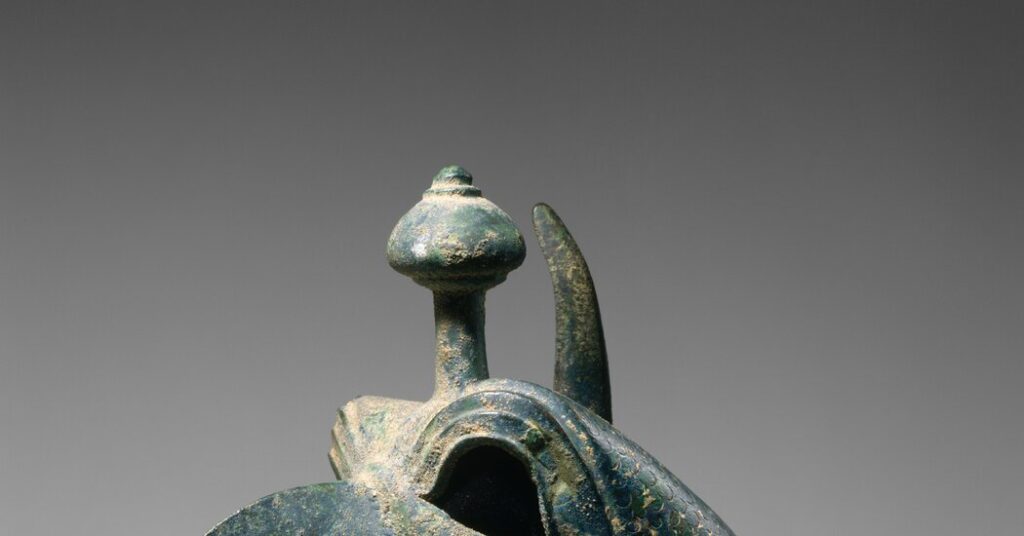The Metropolitan Museum of Art is returning to Greece the bronze head of a griffin, the mythological creature, after determining that the artifact from the 7th century B.C. was likely stolen from an archaeological museum in Olympia in the 1930s.
The museum said the head, which entered the collection as a gift from a former trustee in 1972, will be turned over to Greece’s minister of culture at a ceremony Monday at the Met.
Though discussions about the provenance of the piece have been underway since 2018, the museum said the decision to return it was finalized only a few months ago. It will be the first piece from the Met’s collection to be repatriated since the museum installed a new executive, Lucian Simmons, last year to lead an expanded provenance research unit.
The museum chose to devote more research efforts to determining the provenance of its expansive holdings after a series of seizures of looted artifacts and increased scrutiny over the protocols it had used to accept and purchase works and objects, particularly antiquities.
As head of provenance research, a newly created role, Simmons, a former executive at Sotheby’s, oversees a team of analysts that has been expanded from six to 11.
The ancient Greeks often decorated their bronze cauldrons, used to honor the gods, with the head of a griffin, whose visage is that of an eagle but whose body is that of a lion. On its website, the Met said that the cauldrons set on tripods or conical stands were often used as votive gifts dedicated in Greek sanctuaries from the eighth to the sixth centuries B.C.
The head had been displayed at the entrance to The Met’s Greek and Roman galleries since 1999. It was originally discovered in a river bed in Olympia, in the Peloponnese region of Greece, in 1914 by the curator of the Archaeological Museum of Olympia, but it went missing roughly two decades later, the Met said in a statement. It said research by the Met and Greek authorities showed the antiquity had been stolen.
The head came to the Met in a bequest from Walter C. Baker, a financier and art collector and Met trustee who had bought it in 1948 from a dealer in New York.
“The Met and the Greek Ministry agreed to the return of the Griffin after careful review of records and letters determining that it could not have legitimately left the Archaeological Museum of Olympia,” the Met said in the statement. “This research revealed that the theft of the object occurred under the watch of the head of the Archaeological Museum of Olympia, for which he was referred for criminal prosecution over 80 years ago.”
The work will be lent back to The Met for an exhibition next year, the Met said.
“The Met is honored to collaborate with the Hellenic Republic on the return of this extraordinary object,” said Max Hollein, the museum’s director and chief executive. “We are grateful for our long-standing partnership with the Greek government, and look forward to continued engagement and opportunities for cultural exchange.”
Loan agreements have become a tool for museums looking to continue to display important items at a time when many countries are seeking the return of their cultural heritage.
In 2022, the Met announced another arrangement with Greece to display one of the world’s most significant privately assembled collections of Cycladic antiquities — mostly marble figures and vessels created thousands of years ago in the Cyclades, a group of islands off the coast of Greece in the Aegean Sea.
The works were collected by the businessman and philanthropist Leonard N. Stern. Stern gave his collection to Greece, and in an agreement with the Met and the Greek government, most of the objects are to remain on view at the museum for 25 years, with an acknowledgment that the collection belongs to the Greek state, and with select works periodically returning to Greece. The agreement foresees that the loan can be extended.
On Tuesday, Greek officials will take part in a panel discussion at the Met about the cooperation between the museum and Greece, titled “The Cyclades at the Met: a New Model of Collaboration.”
Greek officials are also scheduled on Tuesday to attend a ceremony at the Manhattan district attorney’s office where the officials are to receive 11 artifacts. The artifacts, which were described as looted, had been seized by the office’s Antiquities Trafficking Unit from private collectors.
Tom Mashberg contributed reporting.


